Brendan Ingle: The legacy lives on
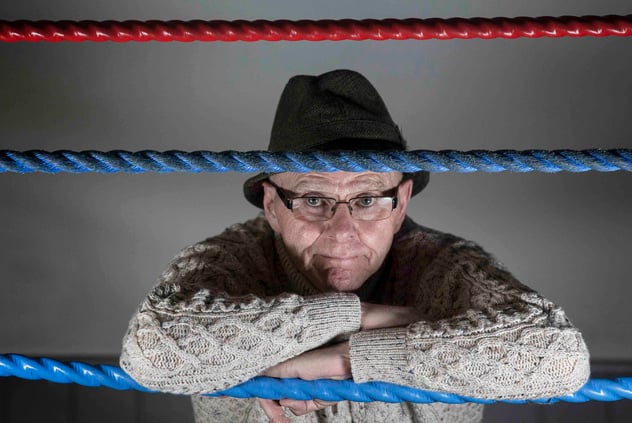
REVERED TRAINER BRENDAN INGLE HAS BUILT AN ENDURING – AND EFFECTIVE – PRESENCE IN U.K. BOXING
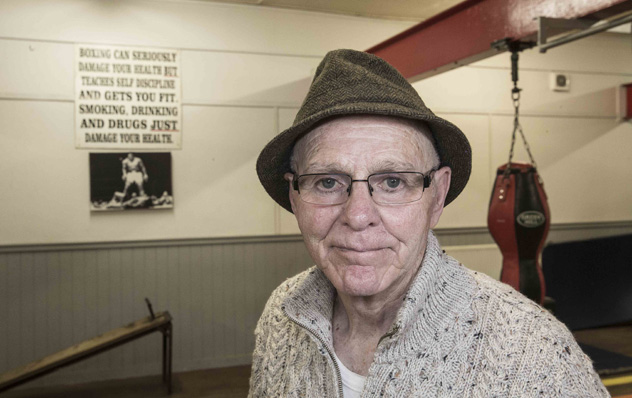
Photos by Scott Heavey
As Brendan Ingle stood outside the Wincobank gym in Sheffield, he watched in horror as a young boxer spat a mouthful of water on the floor. His eyes bulged. His temperature soared. The boxer, aware of his faux pas, first wanted to turn back time, then simply offered an apology. A show of respect if nothing else.
Ingle, now 74, didn’t know the name of the young boxer. He may have once known it but now, in the throes of Alzheimer’s, he has a tough time remembering such details. So he called him “the black fella built like a tank” and, by way of a reprimand, explained that “coughs and sneezes spread diseases.”
Brendan likes to rhyme. He believes in the rhythm of life. His speech, still clear and coherent at this advanced stage in his life, pops, crackles and fizzes with vitality and the young boxers who inhabit his gymnasium shadowbox while singing nursery rhymes and riddles to help with their timing.
Jerome, the spitting culprit, was later revealed to the trainer by another boxer, Callum, who departed the gym shortly afterward. Ingle was grateful for the information but still on a mission to right the wrongs of the world. And it was Callum, his informant, who next appeared in the firing line. Ingle collared him, looked him up and down and said, “His problem is his tattoos. He’s marked himself for life. If he gets into trouble, the first thing that will happen when he goes to the police station is they’ll get him to strip off and then they’ll look for any tattoos.
“I’m not criticizing him for that. He’s happy with it. It’s when they start putting them on their face that I might say something. If he ends up doing something in boxing, I’ll be over the moon. He comes in, he’s well-mannered, he’s polite, he spars anyone in there. Many times he’ll come in and spar Kell Brook.”
Despite the very public dressing down, Callum thanked his mentor for his words and shook his hand. It’s called respect and it’s something Brendan Ingle has earned over the course of five decades at the famous Wincobank gym, perched on a hillside in Sheffield, the Yorkshire city once renowned for its steel industry. They breed them tough here. And the Irish boxing Svengali has made it his home and will leave his legacy here for generations.
Instinctively, when someone’s in a fight, they’ll kick and scratch … But when you look at that gym, you see an art form. You see kids learning how to box. It’s different.
– Brendan Ingle
Callum and Jerome, like the rest, know what the old boy has done. They know about his adventures with “Prince” Naseem Hamed. They also know he’s responsible for the careers of other Wincobank stars such as Johnny Nelson, Herol “Bomber” Graham, Ryan Rhodes and Junior Witter, all of whom thrived either as world champions or world-class contenders. And then there’s the latest world champion from the gym, Kell Brook, who acts as a more immediate template and role model for the likes of Callum and Jerome. These lads have sparred with him, moreover.
“It was brilliant, wasn’t it?” said Callum, referring to Brook’s victory over American Shawn Porter in August. “We all knew he was going to do it but nobody else did. It was great to see him win on the big stage like that. It doesn’t get any bigger.”
Ingle’s role in the Brook camp is considerably less hands-on than it was with, say, Hamed or Nelson, but that’s solely because of his age and the emergence of his sons, Dominic and John, as respected trainers in their own right. They have taken over the reins and now look after the day-to-day running of a gym their father essentially created from scratch. That’s not to say Brendan no longer gets his hands dirty, though. Quite the opposite, in fact.
“I’ve had all sorts of things happen to me health-wise but I still say my prayers and I’m still operating,” he said. “I’m just glad to be alive and to still be going around. I’m glad to be able to go in there and coach and take those boys on the pads. I feel smashing.
“The place is open every day, seven days a week. The [dues] are about seven [British pounds per week]. That’s a pound for two or three sessions a day. People say I’m mad. They say, ‘How do you keep the place going?’ Well, I’ve managed to do it for nearly 50 years now.
“My son John lives just over at the back of the church and my other son, Dominic, lives in that house over there,” explains Ingle, pointing literally across the road. His own house is diagonally across from the gym and a small playground where little children are playing. They look up at him as they pass. He nods back with a kindness. “They’re in twice a day, seven days a week, and they’ve been doing that since they were kids. Dominic is now in charge but things haven’t changed. We’re still turning out British, Commonwealth, European and world champions. The kids that wouldn’t go to school are now graduating from college and university. But, if I tell you the secret, you’ll be as wise as me.”
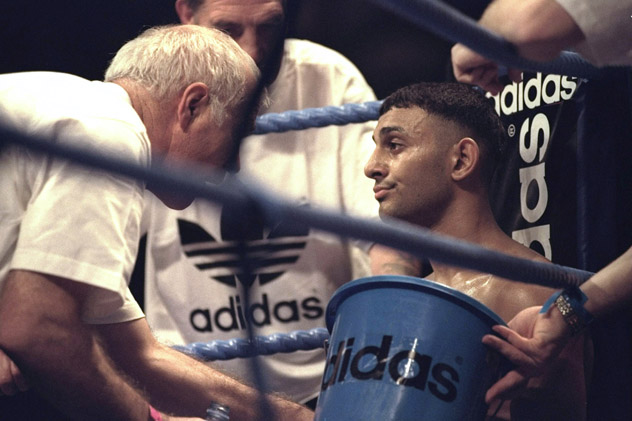 To discover Brendan Ingle’s secret, one must first travel back in time to 1957. That was the year he arrived in Sheffield from Dublin, Ireland, and immediately sensed the struggle and oppression in the steel city.
To discover Brendan Ingle’s secret, one must first travel back in time to 1957. That was the year he arrived in Sheffield from Dublin, Ireland, and immediately sensed the struggle and oppression in the steel city.
“I lived in a place called Manor Top, up Gleadless way,” he said, explaining his journey across the Yorkshire city. “Then I was at Hillsborough Boys Club, then I went to Croft House and then I moved down here. It’s a big area for steelworks but factories were closing and you had all different nationalities moving in. Then kids started fighting. People wanted to prove themselves.”
He was privy to much of the fighting. It was everywhere. He saw kids running wild, in need of direction. They were frustrated. They were clueless. Brendan was quite different.
“I used to get up at a quarter to four in the morning, run on the Wood Bottom, up Shiregreen and then I’d run to Ecclesfield and then go and work 12 hours as a blacksmith striker with a hammer,” he said, describing an 8-mile run, much of it up and down steep hills. “I loved the job in the blacksmith’s because I was dyslexic. Spelling used to drive me mad. Right hand. R-I-G-H-T. Write a letter. W-R-I-T-E. The name Wright. W-R-I-G-H-T. I used to think to myself, why am I getting the cane for getting words wrong all the time?” When he came home, his wife helped him to read.
Yet unlike some of the unruly tearaways he grew accustomed to seeing in Wincobank, Brendan was raised properly. He knew right from wrong. He knew how to behave. It was why he’d often be out picking up litter and it was why one day he was asked by the local vicar to carry out community work in the local area to help save the lost souls that surrounded him.
Seeing it as a challenge, something he could sink his teeth into, Ingle accepted, and so the weekly dance at St Thomas’ church hall was born. After that came the boxing gym, St Thomas’ Boys & Girls Club. Dancing turned into fighting and pretty soon Ingle, a free spirit, a maverick, the great improviser, was combining the two to concoct a boxing style all of his own, a style imprinted on each of the men he trained, from Hamed and Graham to Nelson and Rhodes. Even his lumbering heavyweights boxed the same way. They were all light on their toes, in and out, masters of range and timing, each of them utterly comfortable with their hands down by their sides. They were ostensibly matadors with gloves. Hit and don’t get hit was their mantra.
“Instinctively, when someone’s in a fight, they’ll kick and scratch,” said Ingle. “Or they’ll butt you or bite you. But when you look at that gym, you see an art form. You see kids learning how to box. It’s different. That’s why I put those lines down there on the floor. It was an idea I had years ago. It was supposed to help with footwork. That is the start of everything in boxing.”
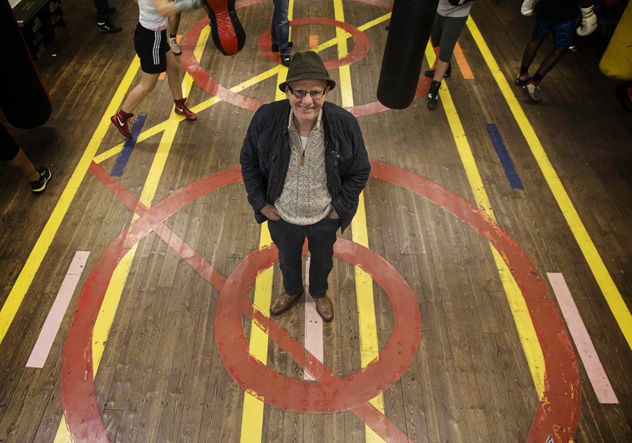 More than just a fighting style, it became an attitude and a lifestyle for many of the boxers who later became staples of the Wincobank gym. They carried a cocksure swagger. They looked after themselves, both inside and outside the ring. They were slicker than your average fighter. They were more often than not switch-hitters. Clever, cool, perpetually upbeat and positive. Ingle modeled them on himself.
More than just a fighting style, it became an attitude and a lifestyle for many of the boxers who later became staples of the Wincobank gym. They carried a cocksure swagger. They looked after themselves, both inside and outside the ring. They were slicker than your average fighter. They were more often than not switch-hitters. Clever, cool, perpetually upbeat and positive. Ingle modeled them on himself.
“People say to me, ‘Brendan, every time I come here you’re talking and you’ve got them singing and dancing and hitting the bags. What do you think the secret of life is?’ I say, ‘It’s very simple. Every morning you wake up, you’re a millionaire. Every hour you live is a bonus. You don’t want to be the richest person in the world, you want to be the happiest.’ They say, ‘OK, what’s happiness?’ I say, ‘It’s a frame of mind. Unfortunately, if you knock around with idiots, you finish up an idiot.’ They say, ‘That doesn’t seem a very nice statement.’ I say, ‘I get them coming in here. They’re idiots getting chucked out of school. They’re in arguments and they’re in fights. If you come in here, you do as you’re told. If you don’t do as you’re told, you don’t come in.'”
People don’t realize that a few years ago I started the Sheffield, Rotherham and District Ex-Boxers Association. I came across so many people with flat noses, cauliflower ears and a croak in a voice from being punched in the throat. I wanted to do something to help them.
-Brendan Ingle
Though the gym is an enjoyable environment in which to thrive, the underlying seriousness and discipline was etched on the faces of each of the boxers, young and old, who said their goodbyes to Ingle that evening. They worship him. They appreciate him. The Ingle name, in Sheffield at least, carries the power of an Ali or a Tyson. Shrouded in similar mystique, it’s just as almighty.
“It’s all about time and patience,” he said. “I’m in charge. If they look good, I look good. It’s simple logic. If they make money, I make money. Who wants to finish up with a flat nose and cauliflower ears? People don’t realize that a few years ago I started the Sheffield, Rotherham and District Ex-Boxers Association. I came across so many people with flat noses, cauliflower ears and a croak in a voice from being punched in the throat. I wanted to do something to help them.”
Perhaps the greatest testament to the Ingle way – to be elusive, to be defensive-minded – are the coherent voices and clean faces of his retired former pupils.
For example, Hamed, though now as wide as he is tall, is just as brash and fast-talking as ever while the likes of Rhodes, Graham and Nelson have all appeared on television as pundits. What’s more, Nelson now enjoys a role as a boxing presenter on Sky Sports.
“We used to go down to Radio Sheffield with Bob Jackson and he was a big help,” said Ingle. “Johnny was great on there. I told him he’d go into television and become a commentator on all the fights. He had gone through everything as a boxer, remember. Every level.
“When Johnny Nelson first came down here, people would say, ‘Why are you wasting your time with him?’ I couldn’t understand what they meant. I said, ‘In time, he’s going to end up British, European and World champion.’ They thought I’d lost the plot.”
After losing the first three bouts of his professional career, a determined Nelson went on to win the full set of cruiserweight titles – British, European and world. He then defended his WBO world cruiserweight title a division record 13 times before retiring in 2005. He is even talking about a potential comeback against Marco Huck.
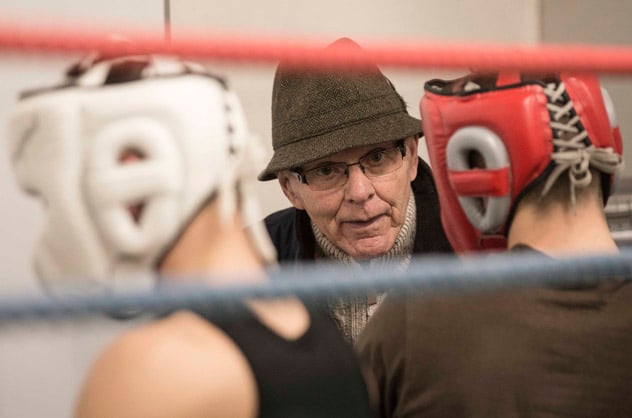 Meanwhile, Nelson’s stablemate at the time, Ryan Rhodes, could have been the best of the bunch, says Ingle. “To me, Ryan Rhodes underachieved,” he said. “He was better than Naseem Hamed.
Meanwhile, Nelson’s stablemate at the time, Ryan Rhodes, could have been the best of the bunch, says Ingle. “To me, Ryan Rhodes underachieved,” he said. “He was better than Naseem Hamed.
“The unfortunate thing was his mother and father were always fighting and battling. His parents splitting up affected him badly, I think. He developed the skills in here and he should have won many world titles. But once there’s problems with the parents, you don’t know what effect it will have on the kids. The mother blamed me. The words she used were, ‘He wants to get away from those f–king Ingles. He’s going to do f–king nothing with them.’ I thought to myself, ‘I don’t talk to anyone like that.'”
It paled in comparison to the issues he’d later have with Hamed, however. The Paddy and The Prince famously conquered the boxing world together, winning the WBO world featherweight title in 1995 and adding the IBF version along the way before splitting in 1998. Memories, therefore, are bittersweet for Ingle.
“Naseem Hamed’s dad’s shop was just over there,” he said, pointing to a 24-hour corner grocery store no more than 150 yards from the gym. “That’s how near he lived. I’d say to him, ‘It’s no good being a good Muslim on a Friday and a bastard the rest of the week. Just as it’s no good being a good Christian on a Sunday and a bastard the rest of the week.’ Civility and good manners cost nothing. Don’t let money become your God. The nicest thing about money is the independence it gives you.
“Unfortunately, he had a brother, Riath, and he was a snake. He was a horrible person. He wanted control. It ruined everything.”
Still, just as Alzheimer’s hasn’t slowed him, the experience with Naz, which later soured and caused a separation, has failed to extinguish Ingle’s fervor for boxing. The Wincobank, you see, is bigger than just one man. It is a production line, a conveyer belt of champions and reformed characters. And Kell Brook, the new IBF world welterweight champion, is its latest success story. For now, he carries the torch. The legacy lives on.
“See that over there?” said Ingle, happily married with five children, as he pointed across the road at the church. “I keep the church garden clean by picking the litter up round there. People ask me why I do it. I say, ‘Because I live around here.’ My mother and father, when we were back in Dublin, would make me do the same. It goes in circles.” And that is Ingle’s most poignant legacy: not just creating champions, which he has done with aplomb by honing a few diamonds, but changing people and a community, through preaching a way of life – through the skills, discipline and knowledge from a life lived in a close-knit corner, with boxing the cornerstone.
Gareth A Davies is boxing correspondent for The Telegraph, London














